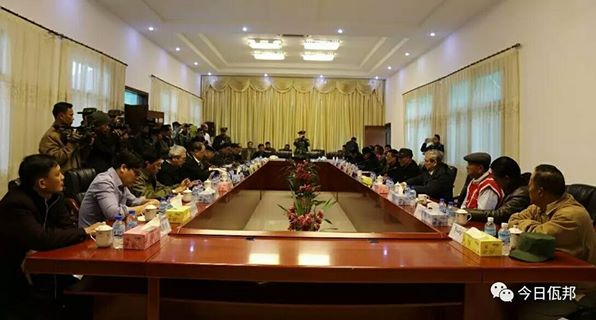RANGOON — The government’s Peace Commission met Wa and Mongla ethnic leaders in their respective self-administered regions of Shan State to discuss peace and regional development at the end of last month.
Vice chairman of the Peace Commission U Thein Zaw led a delegation to Panghseng on Dec. 30 and discussed the United Wa State Party’s (UWSP) seven policies on regional development, the peace process, and collaborating with the central government, according to Peace Commission member U Aung Soe.
The Wa’s request of central government support for regional development originally made to the State Counselor in July was also discussed.
The deputy minister of the President’s Office U Min Thu was among the delegation and said that the Wa and Mongla’s demands would be shared in the future cabinet meetings.
In a meeting with the Mongla’s National Democratic Alliance Army (NDAA) on Dec. 31, the Peace Commission discussed the deployment of Wa troops into Mongla-occupied regions in late September.
Three out of four battalions retreated from deployments inside Mongla territory, according to sources from both ethnic armed groups, but the United Wa State Army (UWSA) said they would only completely retreat when Burma Army troops left the Mongla area.
NDAA leader U Kyi Myint told The Irrawaddy it wants regional peace, and to be united with the Wa. Wa and Mongla groups have conducted joint military exercises over the past five years.
Despite its delegation walking out of the 21st Century Panglong peace conference last year, U Aung Soe said the Wa reiterated its support for the peace process.
The UWSA did not sign the Nationwide Ceasefire Agreement in Oct. 2015 as they said that their bilateral ceasefire agreement was sufficient.
U Aung Soe said she was sure that the UWSA would participate in the next phase of the conference in February.
Nang Lwin Hnin Pwint contributed to this report.
















